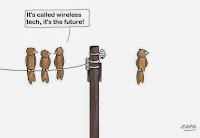El
Future Progressive ( o Continuous) se utiliza:
1. Como todas las formas
progresivas, para hablar de situaciones en “curso” en un momento
específico del futuro. Normalmente, suelen ser situaciones que resultan
de una decisión o programación previa:
This time next year, we will be refurnishing the house.
Con este significado, el Future
Progressive se parece mucho al Present Progresive con valor de futuro
porque se trata de situaciones de las que estamos seguros que tendran
lugar:
This time tomorrow, I’ll be flying to Paris /I’m flying to Paris.
Fijaros también en los adverbios de tiempo que acompañan al Future Progressive.
2. Para hablar de una actividad que forma parte de un programa o una planificación:
The Dean will be welcoming the freshers next Monday.
3. Para especular sobre una situación presente:
You can take Mike’s car. He won’t be using it today- he’s got the flu.
El
Future Perfect se utiliza para:
1. Hablar de una situación que estará acabada antes de un momento específico en el futuro:
By the time you get home, I will have emptied the cupboards.
Se utilizan adverbios de tiempo.
2. Especular sobre una situación presente:
Most employees will have left the office by now.
Existe también una forma de
Future Perfect Progresive que se utiliza para subrayar la duración de una actividad en curso en un momento específico del futuro:
Next year, I will have been working in the company for 10 years.
Exercise 1

 Shall we go to the cimena tonight?
Shall we go to the cimena tonight? 